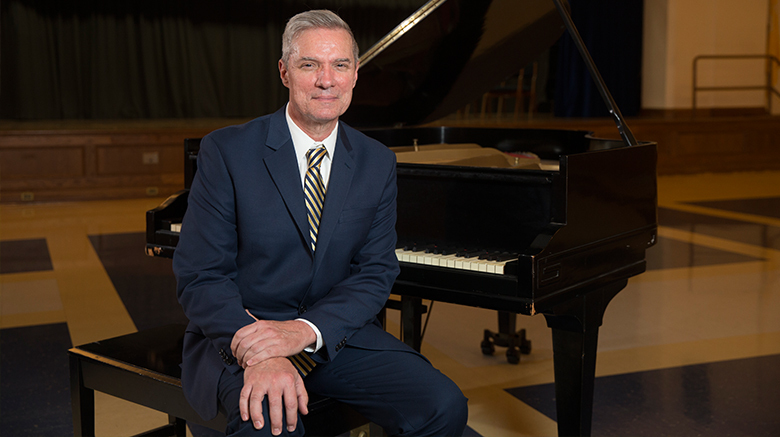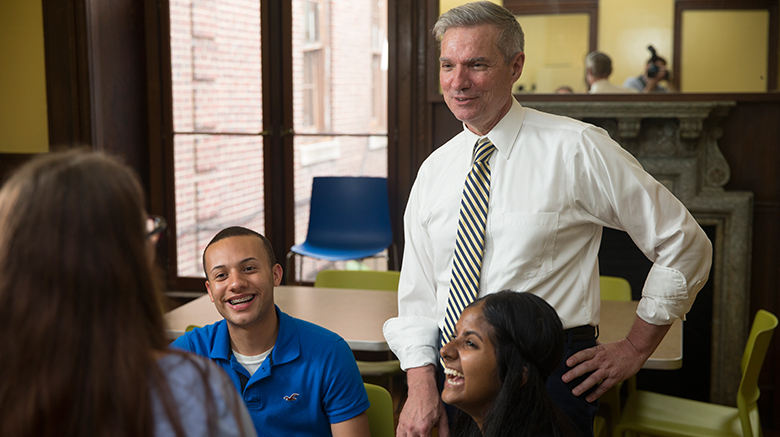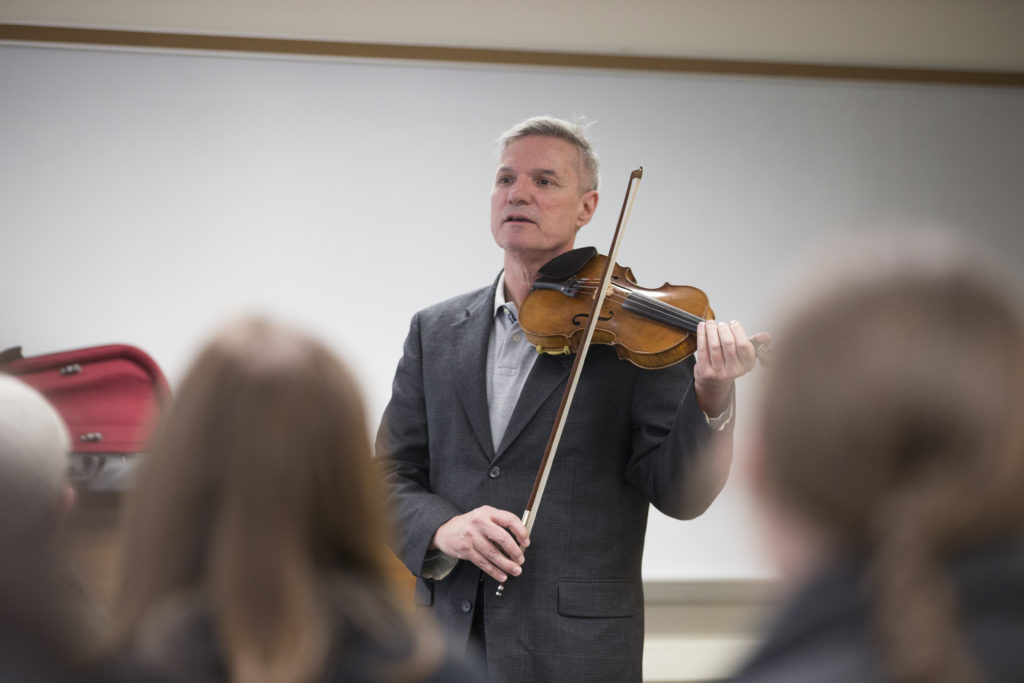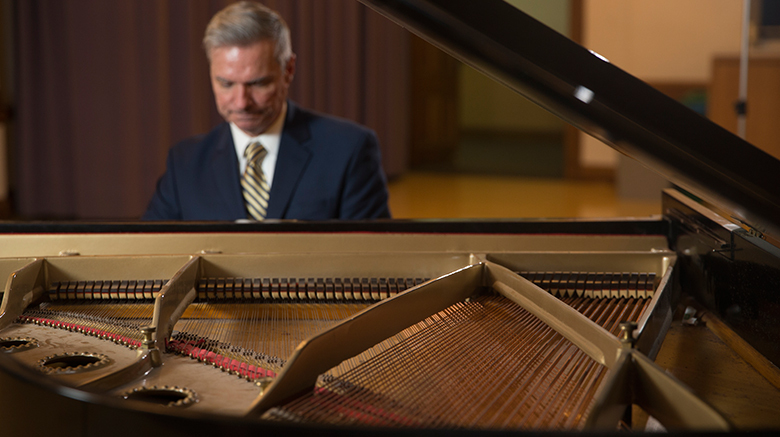He was three, maybe four years old.
St. Joseph’s College President Donald Boomgaarden isn’t sure just how young he was when he started playing the upright Wurlitzer piano in the tiny dining area of his family’s small house in Chula Vista, California. But he remembers that he learned very fast.
“My older sister was taking lessons, and I could play from ear — anything that she was playing,” said Dr. Boomgaarden, 62, who in July became SJC’s eighth president. “By the time I was four — simply from listening — I could play all of her music.”
 The pianist-in-waiting spent two more years — memorizing traditional folk songs the likes of “Oh Susanna” and “Johnny Appleseed” — before getting the chance to sit on the bench for his own professional instruction.
The pianist-in-waiting spent two more years — memorizing traditional folk songs the likes of “Oh Susanna” and “Johnny Appleseed” — before getting the chance to sit on the bench for his own professional instruction.
“We were too poor to have two children taking lessons,” said Dr. Boomgaarden, whose father was a Navy officer and, at the time, stationed at Naval Air Station in San Diego. “It’s one reason why I so assiduously studied what my sister was playing! When she stopped studying, I got to start.”
Those early aspirations to absorb knowledge and acquire skills put Donald Roy Boomgaarden, Ph.D., on a life journey bursting with curiosity and rewarded with enlightenment.
When I’m studying with someone, I understand how much I like to learn. I like to be challenged. I’m a lifelong learner. I think that’s an important part of being in education.”
–SJC President Donald R. Boomgaarden, Ph.D.
The former provost and senior vice president for academic affairs at the University of Scranton in Pennsylvania holds master’s and doctoral degrees from Eastman School of Music at the University of Rochester, and a bachelor’s from Texas State University in San Marcos. He has worked in higher education as a professor and administrator nearly 40 years.
And yet, Dr. Boomgaarden — a concert pianist and country fiddler, and a noted historian of opera, music aesthetics and harmonic theory who converses in four languages — refuses to stop learning. In fact, he still takes music lessons.
“It is an excellent way to maintain a sense of reality about yourself,” Dr. Boomgaarden said, reasoning why he takes bi-weekly violin lessons. “When I’m studying with someone, I understand how much I like to learn. I like to be challenged. I’m a lifelong learner. I think that’s an important part of being in education.”
The Power of Lifelong Learning
Independence, charisma and leadership. Career fulfillment and brain health.
Considering the plethora of benefits stemming from being a lifelong learner, it’s no wonder that upholding SJC’s reputation for creating lifelong learners is at the core of Dr. Boomgaarden’s mission.
“St. Joseph’s students are not just getting a certificate or a diploma, they’re being prepared to go out and transform the world and make it a better place,” he said. “They’re learning to think critically. They’re learning to think creatively. And they’re learning to speak eloquently and to write beautifully.
“But they’re also learning that their education has just begun. It’s the beginning of their learning, not the end,” Dr. Boomgaarden added.
Getting to Know St. Joe’s
Dr. Boomgaarden said it was through the charism of the Sisters of St. Joseph that the ideal of educating the whole person was established long ago at SJC.
If he or she wants to be successful, a new college president cannot come in with a pre-conceived notion of what they think the institution should become. One of the things I must do to be successful is really understand St. Joseph’s — to learn what the campus community wants to hear and to let the campus community know, ‘I want to understand you.’” –President Boomgaarden
“The meetings and the talks I’ve had with the sisters have been very, very touching. I feel such a sense of connection with them,” said Dr. Boomgaarden, who splits his time between SJC Brooklyn and SJC Long Island. “Their love of the institution is so profound. You don’t have to go very long in talking with them before you’re talking about something very deep and serious — but they are just as likely to engage you by shifting to a very humorous topic, as well.”
The new president is utilizing the interactions with the sisters — and meetings with faculty, staff, students and alumni — to develop a clear understanding of the 101-year-old institution.
“If he or she wants to be successful, a new college president cannot come in with a pre-conceived notion of what they think the institution should become,” he said. “One of the things I must do to be successful is really understand St. Joseph’s — to learn what the campus community wants to hear and to let the campus community know, ‘I want to understand you.’”
 With that in mind, Dr. Boomgaarden isn’t looking to re-invent the wheel when it comes to following a strategic plan. He has instructed his cabinet to continue focusing on accomplishing the goals of the existing strategic plan, established in 2015. Among the plan’s chief objectives are raising the visibility of the college, increasing enrollment and boosting fundraising efforts.
With that in mind, Dr. Boomgaarden isn’t looking to re-invent the wheel when it comes to following a strategic plan. He has instructed his cabinet to continue focusing on accomplishing the goals of the existing strategic plan, established in 2015. Among the plan’s chief objectives are raising the visibility of the college, increasing enrollment and boosting fundraising efforts.
“We must find ways to use that strategic plan to guide us and move us forward,” he said. “There are great things in it — many good ideas. It was created with a lot of staff, faculty and student input, so why not use it?”
SJC’s existing strategic plan is in line with the results of a survey of college presidents conducted by Deloitte University Press this year. The presidents ranked fundraising and strategic planning as the most important responsibilities in their day-to-day job. Furthermore, 65 percent of those presidents polled said fundraising, which includes alumni and donor relations, is among their top three responsibilities.
Dr. Boomgaarden has made three interim appointments to his cabinet. Michael Hanophy, Ph.D., a distinguished faculty leader at SJC, was named interim executive dean at SJC Brooklyn in August. In July, longtime SJC educator Thomas Travis, Ph.D., a former vice president at St. Joseph’s, became the College’s interim provost and Department of Philosophy Chair Wendy Turgeon, Ph.D., a distinguished administrator and faculty leader, was named interim executive dean at SJC Long Island.
Dr. Boomgaarden and members of his cabinet are creating clear guidelines relating to the goals of the strategic plan. He intends to make public the progress of those standards via a web-based dashboard, providing views of key performance indicators.
Why He Still Practices
“If I miss one day of practice, I notice it. If I miss two, the critics notice it. If I miss three, the audience notices it.”
Dr. Boomgaarden quoted Polish pianist Ignacy Jan Paderewski to explain why he still practices playing the piano every day.
 “If you want to keep up your playing, no matter how good you are, you have got to practice,” said Dr. Boomgaarden, who practices on pianos on both campuses. “Just like being an athlete, bodybuilder or runner. Stop for two weeks, and you see a decline.”
“If you want to keep up your playing, no matter how good you are, you have got to practice,” said Dr. Boomgaarden, who practices on pianos on both campuses. “Just like being an athlete, bodybuilder or runner. Stop for two weeks, and you see a decline.”
He said it’s important that he maintains his ability to play pieces by Chopin, Beethoven and other composers from memory.
“Once you’ve put all the effort into learning something as difficult as a Chopin ballade, you don’t want to let it go,” he said. “I had one teacher explain it to me as, ‘Don, these pieces are your life. They are your career.’”
Dr. Boomgaarden said that he keeps “enough music in his head” to play two concerts without any music in front of him. “If you have it memorized, you play at a much higher level,” he said.
The Importance of Memorization
The memory skills he developed through his passion for music has allowed Dr. Boomgaarden to memorize large amounts of information, relatively quickly, he said.
“I can memorize people’s names, what they do, their biographies … organizational charts,” said Dr. Boomgaarden, noting that memorization remains a key to learning.
“A lot of people are very limited because they’ve never really developed their ability to memorize,” he said. “There are people who say, ‘Why memorize anything? You can just Google it.’ True, but you’re never going to get beyond a certain point. Googling limits the imagination and provides a false sense of achievement.”
Memorization is one of the reasons why musicians enjoy success in varied careers — not just music, Dr. Boomgaarden said.
“It’s wonderful to hear someone who’s memorized a great piece of music or a Shakespearean sonnet,” he said. “The ability to memorize is linked, at least for me, to any successes I have had.”

